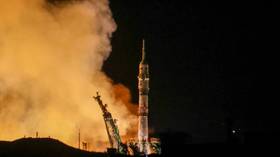Russian cosmonauts break record for longest ISS stay
Oleg Kononenko and Nikolai Chub have spent more than 370 days on board the International Space Station
Russian cosmonauts Oleg Kononenko and Nikolai Chub have broken the record for the longest continuous mission aboard the International Space Station (ISS), having spent more than a year in orbit.
Kononenko and Chub entered the record books at 4:06:51pm Moscow time on Friday, when they beat the previous record set by fellow cosmonauts Sergei Prokopyev and Dmitry Petelin and American astronaut Francisco Rubio, who spent 370 days, 21 hours, 22 minutes, and 16 seconds onboard the ISS from September 2022 to September 2023.
By the time they return to Earth on a Soyuz-MS spacecraft on Monday, Kononenko and Chub will have spent 374 days in space, Russia’s space agency, Roscosmos, said in a statement.
The two cosmonauts arrived at the ISS on September 15 last year. The mission was Chub’s first journey into space, but Kononenko’s fifth. Back in February, Kononenko broke a world record for the most time spent in space by a single person, eclipsing the 878 days and 11 hours set by Russian cosmonaut Gennady Padalka in 2015.
Kononenko had logged 1,000 days away from Earth as of June. By the time he returns home next week, he will have spent a combined total of 1,110 days, or over three years, in space.
Another Russian cosmonaut, Valery Polyakov, holds the record for the longest-ever single trip to space, spending 437 days, 17 hours, 58 minutes and 17 seconds aboard the now defunct Mir space station between January 1994 and March 1995.
There are currently 15 people on board the ISS, including six NASA astronauts and four Roscosmos cosmonauts. Two of the NASA astronauts, Butch Wilmore and Suni Williams, were originally scheduled to return to Earth in June. However, their Boeing Starliner spacecraft encountered technical difficulties while en route to the ISS, and made the trip home with no crew on board earlier this month.
Wilmore and Williams will come home in February aboard a capsule operated by Boeing’s leading competitor, Elon Musk’s SpaceX.






Comments are closed.